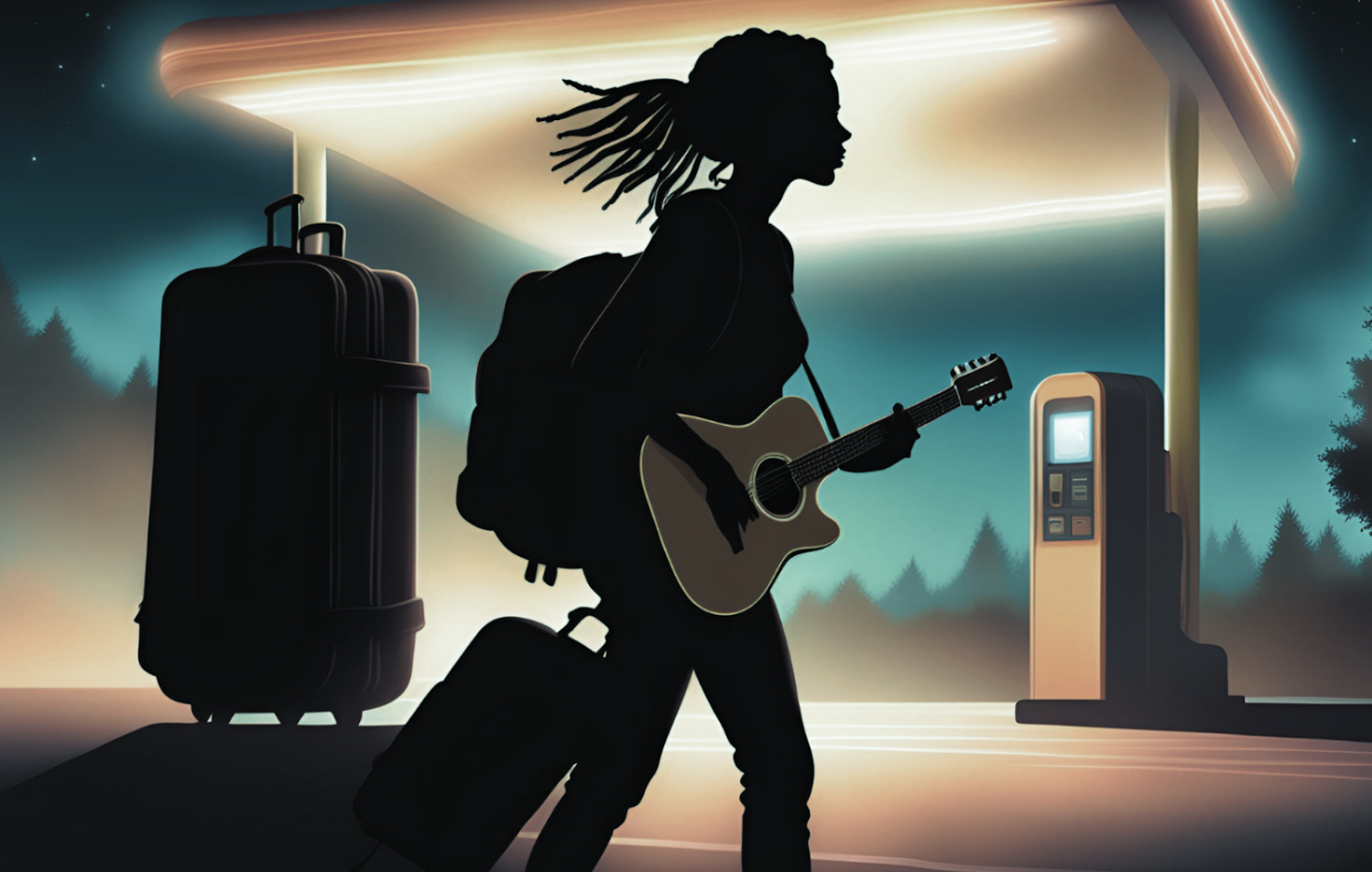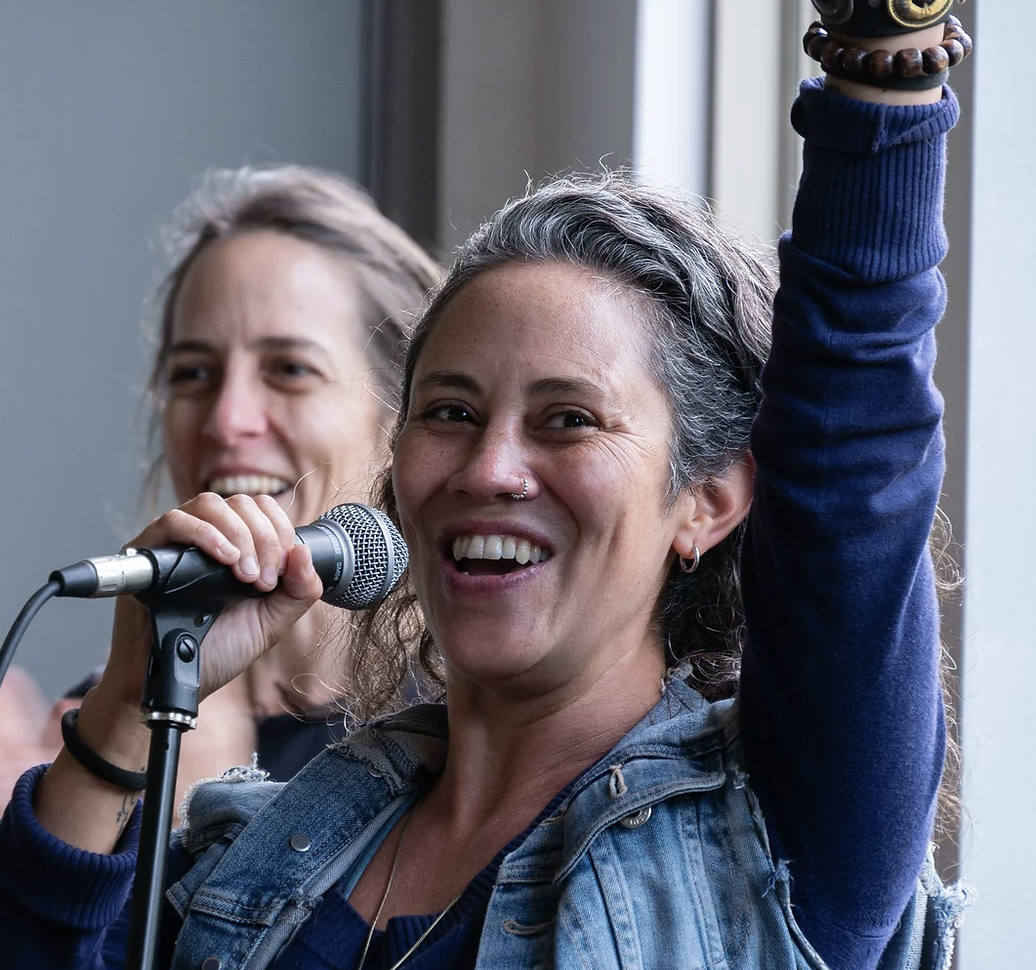an arts worker horror story 🧟♀️ 🪦 🦇
My blood still freezes in my veins when I think about that hot, summer night. I arrived drenched in sweat and stressed about keeping to the agreed time. I had just retrieved a box of my CDs — this story takes place in a distant, pre-Spotify era — a precious treasure that a friend had kept safe for me while I lived and toured in New Zealand. I was finally returning to Chile, and this gig would be my first concert in my country in a long time. Little did I know that my joyous homecoming would soon morph into an arts worker's horror story.
The offer from the festival production was, to say the least, eerie. While it included two passes for the four days of the festival, along with food and transportation from Santiago, it did not account for any payment for my labor. At the time, I thought that wasn't too bad because it gave me the chance to travel to a beautiful island in southern Chile. I would surely meet up with friends, we would dance in the woods, and I could sell my CDs, allowing me to put something in my pockets, which were depleted after the trip. All things considered, it seemed like a fun way to touch down in my home country. I didn’t realize that the specter of precarious work conditions was lurking in the shadows.
I had just spent almost all of the last pesos I had on two taxis to pick up my CDs and haul my camping gear to the meeting point. As soon as I stood there, with my luggage piled up in front of the designated address, I sensed that something was wrong. A deathly silence enveloped everything, and the house lay in an unsettling gloom. I rang the doorbell, and the hair on my arms stood on end as a figure emerged from the dark portal, shrouded in thick smoke. At first, I thought it was a beast that had come down from the mountain in search of food; I was sure that people who called themselves “producers” had the decency to meet artists dressed appropriately, not in boxer shorts as was the case here. Clearly, he hadn’t had time to get dressed — understandably so, given that he seemed quite busy smoking a joint.
I crossed the darkness into a dimly lit house where a group of people were drinking beer and smoking. At that moment, it dawned on me that I was in a sketchy situation, but I held on to hope. Apparently, I hadn’t learned anything from the horror movies that show what happens to overly trusting characters.
The producer, now dressed, drove me in his pick up truck to the meeting point, a nearby gas station. Upon arrival, I saw several smiling individuals carrying camping gear, musical instruments, and yoga mats: my fellow travelers. For a moment, life regained its color. But the feeling wouldn’t last long.
A few meters further, I spotted a van with a flat tire and a couple of concerned faces hovering around it. Was that our “carriage?” A chill ran down my spine.
Soon, the situation worsened, as more and more people kept arriving, all searching for the van that would take them to the festival. I estimated that no more than 15 people could fit into the one vehicle, whose all-the-way-to-the-ground-deflated tire presented a dire omen. There were over 30 passengers waiting, and no one was providing any explanation.
It was well past midnight, and after three hours of waiting a sticky unease had begun to saturate the air. Artists, yoga instructors, and production staff rubbed their hands nervously, and a glint emerged in their eyes that made my flesh crawl. They huddled together in small groups, eyeing each other with suspicion. A murmur swept through the crowd as their eyes lost all compassion and empathy.
I heard a young woman say, “the yoga instructors shouldn't go; they need to take the artists first!” In that instant, I realized that a malevolent spell had fallen over most of those present. They were turning into zombies, wandering spirits whose most terrifying quality was the loss of what makes us human: critical thinking and empathy.
I watched as this evil virus compelled people to direct their discontent toward fellow artists and workers, instead of towards the malevolent master who had summoned us all under such a spectral sorcery. A heavy silence fell, and I sensed that due to their error — or rather, macabre negligence — they had thrown us into a cage and left us there alone to fight for scraps. Whoever defended their spot most fiercely would win the prize of being squeezed into a van like a sardine for a 12-hour journey in a vehicle of dubious condition, only to arrive at a festival under unknown circumstances and without any payment.
I suggested to some people that we should not compete amongst ourselves, as we were all victims of terrible production planning. But it was too late: the zombie virus had already stolen their souls. Such is the power of normalizing abuse and labor precarity.
As I looked around, I noticed that the gas station was almost empty. I could see the zombie master pacing back and forth, attempting to resolve the disaster. Suddenly, he approached me and told me that I would travel with him in his pickup truck. It would be twelve hours on the road in the middle of the night aboard the zombie chief’s ship with Captain Boxer-joint. I felt my whole body refusing such an infernal odyssey, but my last vestige of faith remained due to the desire to experience a beautiful festival in the forest and recover the money I spent to get there.
The possibility of those things happening was nothing more than delirium from my imagination. Partially contaminated by the virus, a kind of mental fog undermined my ability to take care of myself. But there was one being I would never allow anyone to hurt: my guitar. When the zombie-master informed me that my beautiful electro-acoustic Takamine guitar, resting in her elegant hard case adorned with stickers from around the world and lined with red velvet, would have to travel in the back of the pickup, without any cover, exposed to the relentless rain of southern Chile all night long, my cup - finally! - overflowed.
Ohhh, hell no! Not with my guitar! Over my sleepy and hungry corpse. Was the mistreatment I experienced daily as an artist so normalized that only upon seeing my guitar threatened was I able to set a limit and withdraw from such a poorly organized event? Youth and naivety are easy prey for a precarious system that has taught us all our lives that art is a labor of love, that charging for our work is "selling out," and that we should be grateful for being given space to showcase the fruits of our efforts and talents. Although my year in New Zealand showed me that better working conditions are not only possible but deserved, deep down in my youthful mind I still didn't give my work its true value.
At 2 AM, I used my last pesos to take a taxi, overloaded with my luggage, back to my friend's house where I was staying since I still didn’t have a house — having come back from New Zealand only days before. The truth is, I didn't have the energy to confront the producer; I simply told him that I wouldn't participate in the festival under those conditions. He apologized, but that didn’t repair the energy, money, and time wasted, all of which were already so scarce.
When I remember this chilling episode, I realize that I should have broken the chain of abuse much earlier, starting by not agreeing to work without payment. But I also understand that my personal and professional circumstances at that time created fertile ground for abuse that we not only have to stop individually but also systemically. We cannot place all the responsibility on the artists; it is important to understand that a cultural and structural change is needed.
This is the first time I am publicly speaking about this incident. The festival collapsed under the weight of its own ineptitude. Unsurprisingly, I later learned that it was a total disaster. Although I had escaped becoming a zombie that night, I knew I wasn't completely safe as the virus was widespread around the world — but even more so in the Global South. Going back home was certainly a harsh awakening.
While working conditions for artists in Chile have improved and issues like this are becoming more visible, we are still far from reaching the minimum standard. In recent years, collaborative efforts have gained traction as a means to achieve a dignified artistic life, especially since 2019 when our country experienced a social outbreak that gave rise to various groups of women and artists fighting for their rights. At least now we talk and help one other lift our precious guitars out of the pickup trucks that lead to indignity, abuse, and injustice.
Researching the link between zombies and bad work conditions, I came across William Seabrook, author of The Magic Island. In his work, Seabrook delves into local beliefs and how zombies are understood within Haitian culture, emphasizing that behind these myths lie deep and painful social realities. Although his approach is mostly mystical, it also provides a more rational view of the circumstances that can lead to these states, such as the manipulation of people's lives and lack of autonomy. It is evident — and very important to clarify — that in no case is the severity of the abuse suffered by enslaved people comparable to what occurred in this story. However, just like in Seabrook's accounts, the precarious systems of the art world also create conditions that can strip us of our essence — as well as our autonomy and value.
The good news? Artists are far from helpless amidst these challenges. By standing together we can keep our eyes sparkling with inspiration, and use our collective, creative power to cultivate a world in which the only zombies we must face are the ones that come out during Halloween.
Thank you to Carmen Salvador for bravely contributing to Fractured Atlas's blog as a guest writer after entering our open call for arts worker horror stories. You can check out more of her work, writing, and music via Instagram, Spotify, and her artist website.
About Carmen Salvador
Carmen Salvador is a multidisciplinary artist and group facilitator with a 20-year career dedicated to innovative projects that combine literature, music and mindful practices for social transformation. As a musician, she has extensive experience in composition, production, and sound design, both as a songwriter and for performing arts. As a writer, she has received numerous recognitions for her work in short story fiction, micro story fiction and playwriting. She created Zapp School of Creativity, dedicated to fostering creativity for social impact with special focus on autobiographical writing for women.


